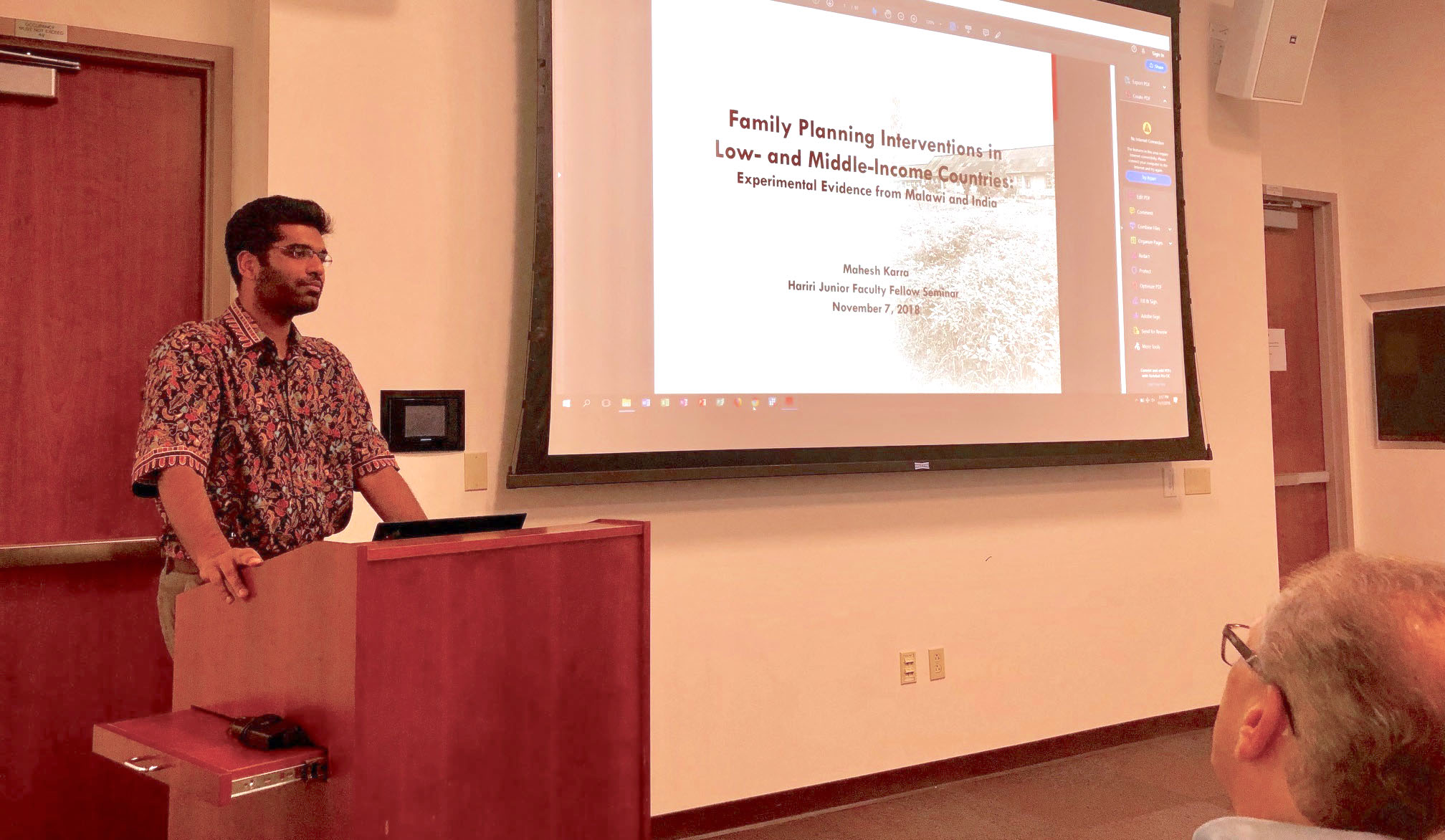Karra Gives Junior Fellow Faculty Presentation at Hariri Institute
Mahesh Karra, Assistant Professor of Global Development Policy at the Frederick S. Pardee School of Global Studies and Associate Director of the Human Capital Initiative at Boston University, delivered a Junior Fellow Faculty Presentation at the Rafik B. Hariri Institute for Computing and Computational Science and Engineering on November 7, 2018.
Karra delivered a talk entitled “Family Planning Interventions in Low- and Middle-Income Countries: Experimental Evidence from Malawi, India, and Sri Lanka,” which focused on preliminary evidence from three ongoing field experiments from Sri Lanka, India, and Malawi that, when taken together, seek to identify the causal impact of family planning interventions on first stage outcomes, including contraceptive use, family planning knowledge, and awareness.
Karra also outlined his plan for evaluating intervention impact on longer term outcomes of interest, including fertility, maternal and child health (MCH), and socioeconomic well-being.
From the abstract of the talk:
In spite of declining birth rates and improvements to maternal health care, the total fertility rate, or the average number of births per woman, remains high in Sub-Saharan Africa; estimates from Demographic and Health Surveys (DHS) indicate that in most Sub-Saharan African countries, between 25 to 40 percent of unmarried women have at least one birth by the age of 19, and many of these births are unplanned. A high total fertility rate and large numbers of unintended pregnancies and unwanted births are causes for social concern because they contribute to high rates of induced abortion, increased maternal morbidity and mortality, and poor child health outcomes, which in turn place substantial health and economic burdens on women, their children, and their families. Improving access to family planning (FP) and reproductive health (RH) care may help African women and couples to meet their desired fertility and to avert unintended pregnancies, and interventions that aim to influence demand and supply of family planning have become increasingly common in developing countries. Nevertheless, there is a need for more impact evaluations of family planning interventions using randomized control trials, particularly in Sub-Saharan Africa where rigorous experimental evidence is scarce. Few randomized control trials have been conducted to assess the causal impact of family planning in low-income countries, and even fewer impact evaluations have been conducted to determine the extent to which such family planning interventions may affect downstream health and development outcomes.
Karra is a 2018 Junior Faculty Fellow at the Hariri Institute. The Hariri Institute Junior Faculty Fellows program was established in 2011 both to recognize outstanding junior faculty at Boston University working in diverse areas of computational data-driven sciences, as well as to provide focal points for supporting broader collaborative research in these areas at BU and beyond. Junior Fellows are selected by the Hariri Institute Steering Committee based on nominations received each spring, and are appointed for a three-year term.
The Institute’s Junior Faculty Fellows demonstrate the benefits achieved in making the leap from quantitative, statistically-driven research to computational, algorithmically-driven research, and the program’s success is a tell-tale sign of the increasing importance of the Institute’s mission of bringing the computational lens to bear on our data-driven world.
Karra’s academic and research interests are broadly in development economics, health economics, quantitative methods, and applied demography. His research utilizes experimental and non-experimental methods to investigate the relationships between population, health, and economic development in low- and middle-income countries.
